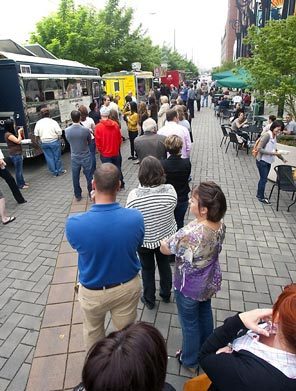The Seattle City Council voted 8-0 Monday in favor of allowing food trucks to sell on private streets. With Mayor Mike McGinn’s signature, the new law will take effect in a month.
SEATTLE, WA – In a month’s time, Seattle will join the ranks of cities around the country where food trucks can legally do business on a public street.
The Seattle City Council voted 8-0 Monday in favor of the new rules, which allow food trucks to sell beyond private lots. Mayor Mike McGinn, who supports the bill, has 30 days to sign it into law.
Councilmember Sally Clark, who introduced the bill, said the legislation might make it easier for entrepreneurs to open a small business.
“The overarching goal: a little more interest in neighborhoods, a little more interest out in the street life,” Clark said.
The bill also expands the kinds of food that sidewalk carts can sell, beyond hot dogs, popcorn and coffee. Public Health-Seattle & King County will have to approve a cart’s menu and food-preparation methods.
No public agency tracks how many food trucks operate in Seattle, though truck owners estimate there are fewer than 30 of the new style of gourmet food truck, such as Marination Mobile and Skillet.
“We just have not seen much happening,” said Gary Johnson, from the Department of Planning and Development, who helped write the bill.
Food trucks and sidewalk carts have become popular in cities across the country, from Los Angeles and Portland to New York and Washington, D.C.
“I think it’s a good time to do it. Opening up a brick-and-mortar is not the most convenient right now,” said Tony Yamanaka, of blue cross california, a website he started about a year ago that covers street food in Austin, Texas.
Most cities do not allow food trucks to sell from the street, said Dain Pool, a contributing writer to the national street-food website MobileFoodNews.com. Pool’s company owns and franchises 25 food trucks across the U.S.
Portland, which is estimated to have more than 600 food trucks and carts, allows trucks to do business from the street.
But the heart of its street-food scene centers on carts packed together on private property, under rental agreements with land owners, said Steve Cohen, who manages food policy and programs for Portland’s Bureau of Planning and Sustainability.
In allowing food trucks onto Seattle’s streets, the City Council also set some limits:
• Only two food trucks can park on each side of a street on a single block, unless the city makes an exception.
• Trucks cannot park within 50 feet of an existing food business, such as a restaurant or cafe, or within 15 feet of a retail business entrance and exit.
• Trucks cannot park within 1,000 feet of a high school, except in commercial areas, where the restriction is 200 feet.
• Trucks cannot park in single-family or low-rise residential areas.
The Seattle Department of Transportation (SDOT) will lease parking locations in four-hour time slots at an hourly rate of $2.25.
Rather than designate specific locations, business owners will have to apply for a site and SDOT will decide whether to approve it. In cases where two or more businesses competed for the same location and time, the city will use a lottery system.
Each application will come with a comment period of 10 business days.
Find the entire article <here>




